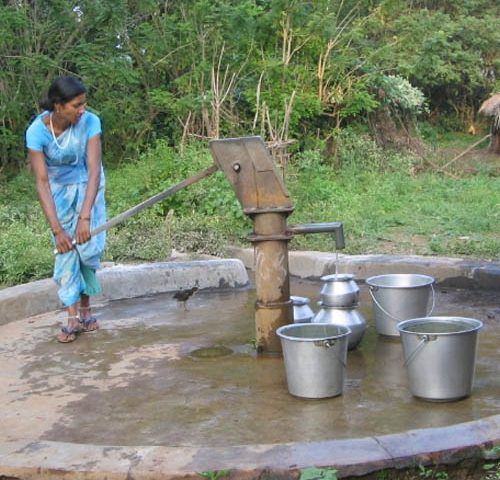It is a common misconception that the deeper you drill a bore well, the more water you will receive. People sometimes dig bores that reach a depth of almost 800 to 1000 feet hoping to receive a never-ending supply of pure drinking water. In reality, this couldn’t be further from the truth. The government has consistently discouraged the digging of bore wells that are more than 400 feet and not just because of depleting groundwater levels.
Water pumped from bores deeper than 400 feet has a high level of heavy metals like arsenic, iron, fluoride and other nitrates which are extremely poisonous, yet most people are unaware of this fact.
Hyderabad is particularly prone to fluoride poisoning. Some areas in Hyderabad district like Qutubullapur, Dulapally and Nizampet report higher than normal levels of fluoride, while in Ranga Reddy district, Balanagar, Shamshabad and Shamirpet have the highest levels of fluoride. The deeper the bore well, the higher the level of fluoride it contains. In areas that do not get municipal water and rely solely on bore water, this could be dangerous as even a 0.1 increase in fluoride levels is extremely harmful. High levels of fluoride have been known to cause a condition called fluorosis that causes brittle bones and teeth.
Says Anita, a resident of an apartment complex in Miyapur, “We receive two big plastic cans of drinking water every day because our complex still does not receive municipal water. I don’t know where this water comes from but we are forced to drink this.”
It is no secret that most of the drinking water supplied in cans is just filtered bore water. If the source of the water and the method of filtration is unknown, drinking such canned water is questionable. As a matter of fact, even RO purified water is not safe for drinking if the machine is not being serviced and filters are not being replaced regularly.
Another big problem with the water from deep bores is that sometimes this water is very old. Water from aquifers lying deep in the rocks can sometimes be as old as 1500 to 6000 years old. Areas like AS Rao Nagar, Toli Chowki, Banjara Hills, Dollar Hills, Uppal and Habsiguda have produced water as old as 1500 to 2000 years in deep bore wells. It is unclear about the long-term effects of depleting the water from such deep aquifers. When these water sources dry up they do not get recharged because rainwater cannot percolate through solid rock. These deep bores will inevitably run dry in the long term. Ironically, it is the shallow bores that get revitalized during the monsoons and therefore provide safe and fresh drinking water for many years.
It is important for the general population to become aware of the dangers of deep bore water and exercise common sense. Some points to be taken into consideration:
1) Bore wells should not be dug beyond a depth of 300 feet
2) Take the help of an experienced geologist before digging a bore well – These experts are able to locate water with the help of instruments. Many times, if rock is discovered at a depth of about 50-80 feet into the ground, it is uncertain if such a bore will yield water for another 400-500 feet and is probably not worth it in terms of cost and quality of water.
3) A second bore well should not be drilled very near to a dried up bore well – It can collapse due to gravitational pull and earth vibrations. A distance of at least 15 feet from the first well should be maintained.
4) A rainwater harvesting pit can be constructed near a defunct bore well to help recharge it
A pit 3-4 feet in depth and 3 feet by 3 feet in length and breadth should be dug. A layer of sand is poured followed by a layer of small size concrete. This process is repeated till the pit is completely full. During the rainy reason, the rain water gets filtered in the pit before entering the bore well. Many wells with scanty water supply can be improved by this technique.
5) If possible, an open, dug well should be maintained instead of a bore well – This traditional version of a well not only stores water but also recharges the ground water during the rains.
6) Canned water should be tested before consumption – There are many labs around the city that conduct these tests for as low as Rs 790 for raw water testing and Rs 990 for drinking water testing. Online labs like Purityportal will even come to your home to collect the water for testing.



